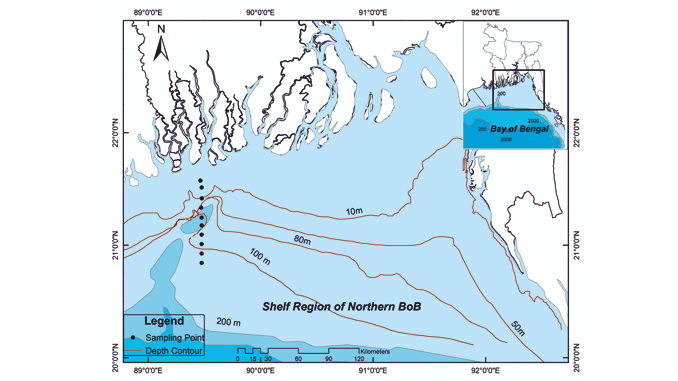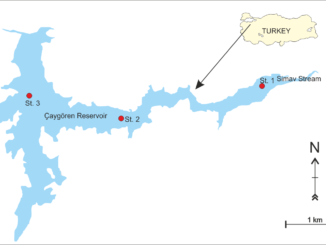
Paper category: Original research paper
Corresponding author: Muhammad Abdur Rouf (roufku@yahoo.com)
DOI: 10.1515/ohs-2020-0035
Received: 07/01/2020
Accepted: 24/04/2020
Full text: here
Citation (APA style): Abdur Rouf, M., Antu, A., & Noor, I. (2020). Seasonal and annual variability in chlorophyll-a in the shelf region of the Northern Bay of Bengal using MODIS-Aqua data, Oceanological and Hydrobiological Studies, 49(4), 398-407. doi: https://doi.org/10.1515/ohs-2020-0035
Abstract
Chlorophyll-a (Chl-a) concentration is an important issue in ocean ecosystem management and research. This study investigates seasonal and annual variability in Chl-a and its relationship with sea surface temperature (SST) and river discharge in the shelf region of the Northern Bay of Bengal (BoB), as well as validates satellite data against in-situ data. Moderate Resolution Imaging Spectroradiometer (MODIS) Aqua satellite data on Chl-a concentration and SST from 2002–2018 were used in this study. River discharge data were obtained from the Bangladesh Water Development Board (BWDB). The annual Chl-a concentration ranged from 2.08 to 2.94 mg m<sup>−3</sup>, with an average of 2.43 ± 0.24 mg m<sup>−3</sup>. The Chl-a concentration was found higher (2.21 ± 0.56 mg m<sup>−3</sup>) during the northeast monsoon (October–February) and lower (1.81 ± 1.14 mg m<sup>−3</sup>) during the pre-monsoon season (March–May). The study revealed a declining trend in Chl-a concentration from 2002 to 2018, and the rate of change was −0.0183 mg m<sup>−3</sup> year<sup>−1</sup>. Chl-a concentration showed a weak inverse relationship with SST, both annually and seasonally, especially in the pre-monsoon season. River discharge masked the effect of SST on Chl-a variability during the southwest and northeast monsoon. A reasonable correlation (r = 0.78) was found between the MODIS-Aqua data and in-situ Chl-a observations.
Acknowledgements
The authors are grateful to the Bangladesh Navy for helping to collect water samples from the northern BoB. The authors would also like to thank NASA’s Ocean Biology Distributed Active Archive Center for MODIS-Aqua chlorophyll-a and SST data and the Bangladesh Water Development Board for providing river discharge data. Futhermore, the authors acknowledge the Khulna University Research Cell and the National Science and Technology (NST) fellowship of Bangladesh, which provided fincancial support for the research.
References
Aminot, A. & Rey, F. (2001). Chlorophyll a: Determination by spectroscopic methods. ICES Tech. Mar. Environ. Sci. 30(58): 17pp. DOI: 10.25607/OBP-278.
Barnett, T.P., Pierce, D.W. & Schnur, R. (2001). Detection of anthropogenic climate change in the world's oceans. Science 292(5515): 270–274. DOI: 10.1126/science.1058304.
Behrenfeld, M.J., O’Malley, R.T., Siegel, D.A., McClain, C.R., Sarmiento, J.L. et al. (2006). Climate-driven trends in contemporary ocean productivity. Nature 444(7120): 752–755. DOI: 10.1038/nature05317.
Bhattathiri, P., Pant, A., Sawant, S., Gauns, M., Matondkar, S. et al. (1996). Phytoplankton production and chlorophyll distribution in the eastarn and central Arabian Sea in 1994–1995. Curr. Sci. 71(11): 857–862. URL: http://drs.nio.org/drs/handle/2264/2149.
Bhushan, R., Bikkina, S., Chatterjee, J., Singh, S.P., Goswami, V. et al. (2018). Evidence for enhanced chlorophyll-a levels in the Bay of Bengal during early north-east monsoon. J. Oceanogr. Mar. Sci. 9(2): 15–23. DOI: 10.5897/JOMS2017.0144.
Brewin, R.J., Raitsos, D.E., Pradhan, Y. & Hoteit, I. (2013). Comparison of chlorophyll in the Red Sea derived from MODIS-Aqua and in vivo fluorescence. Remote Sens. Environ. 136: 218–224. DOI: 10.1016/j.rse.2013.04.018.
Brodie, J., De'ath, G., Devlin, M., Furnas, M. & Wright, M. (2007). Spatial and temporal patterns of near-surface chlorophyll a in the Great Barrier Reef lagoon. Mar. Freshwater Res. 58(4): 342–353. DOI: 10.1071/mf06236.
Chaturvedi, N. (2005). Variability of chlorophyll concentration in the Arabian Sea and Bay of Bengal as observed from SeaWiFS data from 1997–2000 and its interrelationship with Sea Surface Temperature (SST) derived from NOAA AVHRR. Int. J. Remote Sens. 26(17): 3695–3706. DOI: 10.1080/01431160500159818.
Chauhan, P., Mohan, M., Sarngi, R.K., Kumari, B., Nayak, S. et al. (2002). Surface chlorophyll a estimation in the Arabian Sea using IRS-P4 Ocean Colour Monitor (OCM) satellite data. Int. J. Remote Sens. 23(8): 1663–1676. DOI: 10.1080/01431160110075866.
Coleman, J.M. (1969). Brahmaputra River: channel processes and sedimentation. Sediment. Geol. 3(2–3), 129–239. DOI: 10.1016/0037-0738(69)90010-4.
Dasgupta, S., Singh, R.P., & Kafatos, M. (2009). Comparison of global chlorophyll concentrations using MODIS data. Adv. Space Res. 43(7): 1090–1100. DOI: 10.1016/j.asr.2008.11.009.
Dey, S., & Singh, R.P. (2003). Comparison of chlorophyll distributions in the northeastern Arabian Sea and southern Bay of Bengal using IRS-P4 Ocean Color Monitor data. Remote Sens. Environ. 85(4): 424–428. DOI: 10.1016/s0034-4257(03)00025-7.
Goodbred S.L. & Kuehl, S.A. (2000). The significance of large sediment supply, active tectonism, and eustasy on margin sequence development: Late Quaternary stratigraphy and evolution of the Ganges–Brahmaputra delta. Sediment. Geol. 133(3–4), 227–248. DOI: 10.1016/s0037-0738(00)00041-5.
Goodbred S.L., Kuehl, S.A., Steckler, M.S., & Sarker, M.H. (2003). Controls on facies distribution and stratigraphic preservation in the Ganges–Brahmaputra delta sequence. Sediment. Geol. 155(3–4): 301–316. DOI: 10.1016/s0037-0738(02)00184-7.
Haëntjens, N., Boss, E. & Talley, L.D. (2017). Revisiting Ocean Color algorithms for chlorophyll a and particulate organic carbon in the Southern Ocean using biogeochemical floats. J. Geophys. Res.: Oceans 122(8): 6583–6593. DOI: 10.1002/2017JC012844.
Hu, C., Lee, Z. & Franz, B. (2012). Chlorophyll aalgorithms for oligotrophic oceans: A novel approach based on three‐band reflectance difference. J. Geophys. Res.: Oceans 117(C1): C01011. DOI: 10.1029/2011jc007395.
Islam, S.N. & Gnauck, A. (2008). Mangrove wetland ecosystems in Ganges-Brahmaputra delta in Bangladesh. Front. Earth Sci. China 2(4): 439–448. DOI: 10.1007/s11707-008-0049-2.
Jeffrey, S. & Mantoura, R. (1997). Development of pigment methods for oceanography: SCOR-supported Working Groups and objectives In S. Jeffrey, R. Mantoura, & S. Wright (Eds.), Phytoplankton pigments in oceanography: guidelines to modern methods (pp. 19–36). Paris, France.: UNESCO Publishing.
Johnson, K.S., Chavez, F.P. & Friederich, G.E. (1999). Continental-shelf sediment as a primary source of iron for coastal phytoplankton. Nature 398(6729): 697. DOI: 10.1038/19511.
Khalil, I., Mannaerts, C. & Ambarwulan, W. (2009). Distribution of chlorophyll-a and sea surface temperature (SST) using modis data in east Kalimantan waters, Indonesia. J. Sustain. Sci. Manage. 4(2): 113–124.
Krishna, K.M. (2013). Cyclone Persuade on Chlorophyll-A Enrichment in the Bay of Bengal. J. Geol. Geosci. 2(134): 1–3. DOI: 10.4172/2329-6755.1000134.
Kuehl, S.A., Levy, B.M., Moore, W.S. & Allison, M.A. (1997). Subaqueous delta of the Ganges-Brahmaputra river system. Mar. Geol. 144(1–3): 81–96. DOI: 10.1016/s0025-3227(97)00075-3.
Levitus, S., Antonov, J.I., Wang, J., Delworth, T.L., Dixon, K.W. & Broccoli, A.J. (2001). Anthropogenic warming of Earth's climate system. Science 292(5515): 267–270. DOI: 10.1126/science.1058154.
Lorenzen, C.J. (1967). Determination of chlorophyll and pheo‐pigments: spectrophotometric equations. Limnol. Oceanogr. 12(2): 343–346. DOI: 10.4319/lo.1967.12.2.0343.
Madhu, N., Maheswaran, P., Jyothibabu, R., Sunil, V., Revichandran, C. et al. (2002). Enhanced biological production off Chennai triggered by October 1999 super cyclone (Orissa). Curr. Sci. 82(12): 1472–1479. URL: http://drs.nio.org/drs/handle/2264/287.
Nagamani, P., Hussain, M., Choudhury, S., Panda, C., Sanghamitra, P. et al. (2013). Validation of chlorophyll-a algorithms in the coastal waters of Bay of Bengal initial validation results from OCM-2. J. Indian Soc. Remote Sens. 41(1): 117–125. DOI: 10.1007/s12524-012-0203-x.
Nagamani, P., Shikhakolli, R. & Chauhan, P. (2011). Phytoplankton variability in the Bay of Bengal during winter monsoon using Oceansat-1 Ocean Colour Monitor data. J. Indian Soc. Remote Sens. 39(1): 117–126. DOI: 10.1007/s12524-010-0056-0.
O'Reilly, J.E., Maritorena, S., Mitchell, B.G., Siegel, D.A., Carder, K.L. et al. (1998). Ocean color chlorophyll algorithms for SeaWiFS. J. Geophys. Res.: Oceans 103(C11): 24937–24953. DOI: 10.1029/98JC02160.
Patti, B., Guisande, C., Vergara, A., Riveiro, I., Maneiro, I. et al. (2008). Factors responsible for the differences in satellite-based chlorophyll a concentration between the major global upwelling areas. Estuar. Coast. Shelf Sci. 76(4): 775–786. DOI: 10.1016/j.ecss.2007.08.005
Poornima, D., Shanthi, R., Raja, S., Sethubathi, G.V., Thangaradjou, T. et al. (2013). Understanding the spatial variability of chlorophyll a and total suspended matter distribution along the southwest Bay of Bengal using in-situ and OCM-2 & MODIS-Aqua measurements. J. Indian Soc. Remote Sens. 41(3): 651–662. DOI: 10.1007/s12524-012-0233-4.
Prasad, A.K., & Singh, R.P. (2010). Chlorophyll, calcite, and suspended sediment concentrations in the Bay of Bengal and the Arabian Sea at the river mouths. Adv. Space Res. 45(1): 61–69. DOI: 10.1016/j.asr.2009.07.027.
Qasim, S. (1977). Biological productivity of the Indian Ocean. Indian J. Mar. Sci. 6(2): 122–137. URL: http://nopr.niscair.res.in/handle/123456789/39365.
Radiarta, I.N., & Saitoh, S.-I. (2008). Satellite-derived measurements of spatial and temporal chlorophyll-a variability in Funka Bay, southwestern Hokkaido, Japan. Estuar. Coast. Shelf Sci. 79(3): 400–408. DOI: 10.1016/j.ecss.2008.04.017.
Sarangi, R. & Devi, K.N. (2017). Space-based observation of chlorophyll, sea surface temperature, nitrate, and sea surface height anomaly over the Bay of Bengal and Arabian Sea. Adv. Space Res. 59(1): 33–44. DOI: 10.1016/j.asr.2016.08.038.
Sarangi, R., Nayak, S. & Panigrahy, R. (2008). Monthly variability of chlorophyll and associated physical parameters in the southwest Bay of Bengal water using remote sensing data. Indian J. Mar. Sci. 37(3): 256–266. URL: http://hdl.handle.net/123456789/2047.
Sathyendranath, S., Gouveia, A.D., Shetye, S.R., Ravindran, P. & Platt, T. (1991). Biological control of surface temperature in the Arabian Sea. Nature 349(6304): 54. DOI: 10.1038/349054a0 .
Shetye, S., Gouveia, A., Shankar, D., Shenoi, S., Vinayachandran, P. et al. (1996). Hydrography and circulation in the western Bay of Bengal during the northeast monsoon. J. Geophys. Res.: Oceans 101(C6): 14011–14025. DOI: 10.1029/95jc03307.
Singh, R.P. & Chaturvedi, P. (2010). Comparison of chlorophyll concentration in the Bay of Bengal and the Arabian Sea using IRS-P4 OCM and MODIS Aqua. Indian J. Geo-Mar. Sci. 39(3): 334–340. URL: http://hdl.handle.net/123456789/10670.
Smyth, T.J., Miller, P.I., Groom, S.B. & Lavender, S.J. (2001). Remote sensing of sea surface temperature and chlorophyll during Lagrangian experiments at the Iberian margin. Prog. Oceanogr. 51(2–4), 269–281. DOI: 10.1016/S0079-6611(01)00070-2.
Subramaniam, A., Yager, P., Carpenter, E., Mahaffey, C., Björkman, K. et al. (2008). Amazon River enhances diazotrophy and carbon sequestration in the tropical North Atlantic Ocean. Proc. Natl. Acad. Sci. 105(30): 10460–10465. DOI: 10.1073/pnas.0710279105.
Suwannathatsa, S. & Wongwises, P. (2013). Chlorophyll distribution by oceanic model and satellite data in the Bay of Bengal and Andaman Sea. Oceanol. Hydrobiol. Stud. 42(2): 132–138. DOI: 10.2478/s13545-013-0066-y.
Venkateswrlu, P. & Rao, K. (2004). A study on cyclone induced productivity in South-Western Bay of Bengal during November-December 2000 using MODIS data products. In IGARSS 2004. 2004 IEEE International Geoscience and Remote Sensing Symposium, Anchorage, 20–24 Sept. 2004 (pp. 3496–3499). AK, USA: IEEE. DOI: 10.1109/IGARSS.2004.1370462.
Walton, C., Pichel, W., Sapper, J., & May, D. (1998). The development and operational application of nonlinear algorithms for the measurement of sea surface temperatures with the NOAA polar‐orbiting environmental satellites. J. Geophys. Res.: Oceans 103(C12): 27999–28012. DOI: 10.1029/98JC02370.
Zhang, H., Qiu, Z., Sun, D., Wang, S. & He, Y. (2017). Seasonal and Interannual Variability of Satellite-Derived Chlorophyll-a (2000–2012) in the Bohai Sea, China. Remote Sens. 9(6): 582. DOI: 10.3390/rs9060582.


Bądź pierwszy, który skomentuje ten wpis